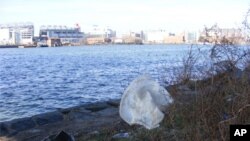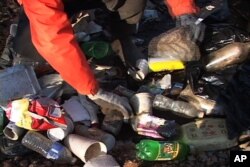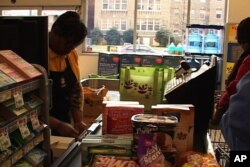Washington's Anacostia River is filthy. Litter collects on its shores and plastic bags float in its current.
Known as the District of Columbia's "forgotten river," it flows from Maryland to the U.S. capital, finally merging into the larger, better known Potomac River. Trash floating in the Anacostia can eventually wind up in the Atlantic Ocean.
Brent Bolin is with the Anacostia Watershed Society. He believes the new bag fee instituted in Washington will help clean up the city and the Anacostia River.
"Metropolitan Washington's Council of Governments did a trash survey," says Bolin. "Throughout the Anacostia, they found around 33 percent of the trash they recovered, around 12-thousand out of 36-thousand items, were plastic bags."
The new five cent fee began January 1st, and applies to any bag - large or small, plastic or paper - at all retail outlets. However, shoppers can avoid the fee if they bring their own bags.
But many store patrons forget to bring bags.
"Unfortunately we didn't bring enough today, so we had to pay for five extra bags," says one shopper. "That's okay. Next time we'll know better. We'll just keep them in the car."
Steve Ward volunteers to help clean an experimental trash trap on a small tributary of the Anacostia. He owes the excess garbage simply to bad behavior.
"It's litterbugs. It's absolutely litterbugs, just throwing their stuff out, dropping it right on the street or sidewalk," says Ward. "And the action of a heavy rain will just get that stuff mobile, floating. That's were all this stuff comes from. The product of litterbugs."
At Giant Food, a chain grocery store in northwest Washington, the new bag fee has met with little resistance, according to store manager, Jack Eaton.
"It was a very popular move on our part," he says. "And I think that it's really pushing that issue. And it's getting involved so all that trash, all that litter, it just blows in the wind. So, we should see a pretty immediate effect of that."
Grocery stores in Washington were at first opposed to the idea of a bag fee, saying they would lose business to retail stores in nearby Virginia or Maryland. But Giant Food joined forces with the Anacostia Watershed Society, and gave away about 250,000 reusable bags to their Washington customers.
Eaton says, "We packed everybody's orders in these reusable bags to help the customer get acclimated to the new bag tax and try to lessen the shock to their system. So, it's been well received and we've had numerous positive comments on it."
But not everyone is happy with the new bag fee. "You have to remember to get your tote bags and your plastic bags because they're five cents each. I think it's ridiculous," argues one shopper who says the tax falls hardest on the elderly.
Grover Norquist of anti-tax advocacy group Americans for Tax Reform shares that sentiment, calling the bag fee just another tax on consumers.
"The politicians want to have a tax on bags. The fact that they want to try to call it a fee tells you they're liars as well as tax increasers."
The Anacostia Watershed Society says the goal is not to raise money, but to change behavior. Washington city officials expect to raise three or four million dollars this year to help clean up the Anacostia River, and they predict that eventually there will be fewer bags and less trash in the waterways of the U.S. capital.
You can watch this, and all of Rebecca's "Going Green" reports here.
The Anacostia River is filthy. Litter collects on its shores and plastic bags swim in its current.
Known as Washington, D.C.'s "Forgotten River," it flows from Maryland to the U.S. capital, finally merging into the larger, better-known Potomac River. Trash from there can eventually end up in the Atlantic Ocean.
Brent Bolin is with the Anacostia Watershed Society. He believes the new bag fee instituted in Washington will help clean up the city and the Anacostia.
Brent Bolin, Anacostia Watershed Society
"Metropolitan Washington's Council of Governments did a trash survey. Throughout the Anacostia, they found around 33 percent of the trash they recovered - around 12-thousand out of 36-thousand items that they recovered - were plastic bags."
VO
The five cent fee applies to any bag - large or small, plastic or paper - at all retail outlets. You can avoid the fee if you remember to bring your own bag.
MOS: grocery store
"Unfortunately we didn't bring enough today. So we had to pay for five extra bags. That's okay. Next time we'll know better. We'll just keep them in the car."
VO
Steve McKinley Ward volunteers to help clean up an experimental trash trap on a small tributary of the Anacostia. He owes the excess garbage simply to bad behavior.
Steve Ward, Cleanup Volunteer
"It's litterbugs. It's absolutely litterbugs, just throwing their stuff out, dropping it right on the street or sidewalk. And the action of a heavy rain will just get that stuff mobile, floating. And all the water goes to one place, a little storm drain inlet port right at the edge of the curb. Goes under there [and] this goes with it. That's were all this stuff comes from. The product of litterbugs."
VO
At this grocery store in northwest Washington, the new bag fee has met with little resistance, according to store manager, Jack Eaton.
Jack Eaton, Giant Store Manager
"It was a very popular move on our part. And I think that it's really pushing that issue. And it's getting involved so all that trash, all that litter, it just blows in the wind. So, we should see a pretty immediate effect of that."
VO
Grocery stores in Washington were, at first, opposed to the idea of a bag fee, saying they would lose business to retail stores in nearby Virginia or Maryland. But Giant Food joined forces with the Anacostia Watershed Society, and gave away about a quarter of a million reusable bags to their Washington customers.
Jack Eaton, Giant Store Manager
"We packed everybody's orders in these reusable bags to help the customer get acclimated to the new bag tax and try to lessen the shock to their system. So, it's been well received and we've had numerous positive comments on it."
VO
But not everyone is happy with the new bag fee. This shopper says any additional fee is hard on the elderly.
MOS, Shopper
"You have to remember to get your tote bags and your plastic bags because they're five cents each. I think it's ridiculous."
VO
Grover Norquist of Americans for Tax Reform shares that sentiment, calling the bag fee just another tax on consumers.
Grover Norquist, Americans for Tax Reform
"The politicians want to have a tax on bags. The fact that they want to try to call it a fee tells you they're liars as well as tax increasers."
VO
Bag fee or bag tax - it still costs the same: five cents. But the Anacostia Watershed Society says the goal is not to make money, but to change behavior. The city expects to make three or four million dollars this year to help clean up the Anacostia and that eventually there will be fewer bags, less trash and a cleaner environment. I'm _________.
###










